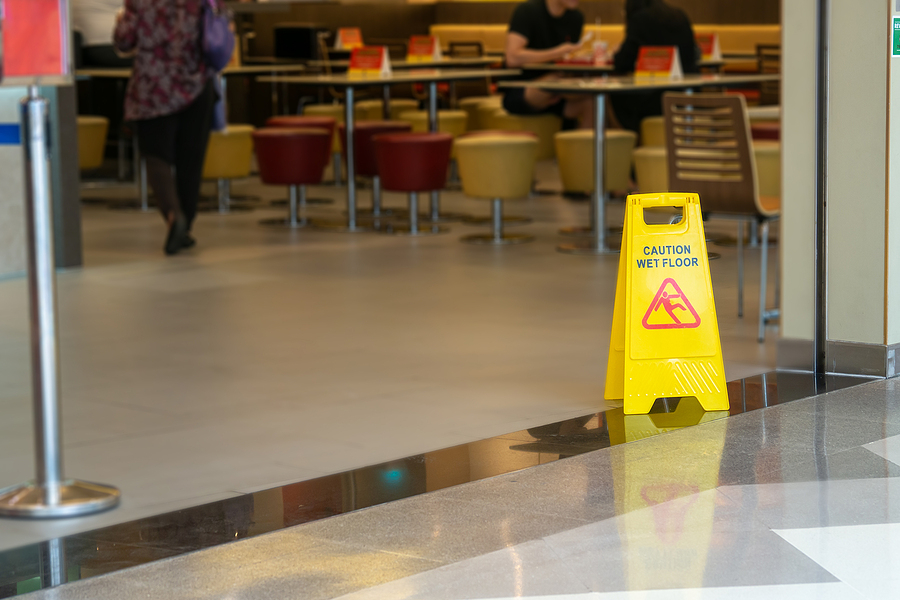Every retail store – or any other business open to the public, for that matter – owes the people coming into that business a duty to do whatever possible to prevent slip and fall accidents. When the business fails to do so, and someone is injured, the victim may be able to file a personal injury lawsuit.
At Sand Law, we’ve helped many clients who have suffered catastrophic injuries because a business failed to take the steps necessary to protect their customers. If you or someone close to you fell due to the negligence of anyone associated with a grocery store, a retail location, or any other place that invited the general public to enter, we may be able to help you as well.
You can schedule a no obligation, free review of your case by giving us a call at 651-291-7263 or using our online contact form.
These are just some of the steps businesses are supposed to take to protect customers from slips and falls.

Conduct Regular Inspections of Potential Hazards and Document Them
Employees must check the premises on a regular basis to identify areas that pose the highest risk for slip and fall accidents. They should look for cracked, uneven surfaces, wet floors, or any other hazards that could result in a severe injury. Walkways should be kept dry and free of obstacles.
If a hazard does exist, employees should record it. And then they should also record the actions taken to eliminate the risk. Inspections should also be documented in a log every day.
Keep the Floor Free from Clutter and Mess
Stocking shelves can be an incredibly intricate operation. They can easily result in an unsuspecting customer tripping over a box. Or stumbling over an item mistakenly left on the floor. Businesses must have procedures in place to keep all walkways clear. Cleaning up clutter will go a long way toward preventing a fall that could result in the victim incurring significant damages, such as medical bills and more.
Maintain Parking Lots Properly
The parking lot of a retail store can be just as dangerous as inside. One of the most common reasons people file personal injury lawsuits is because they tripped in a parking lot due to insufficient lighting. Businesses have a duty to keep their lots clear of obstacles that could severely injure a patron.
Fix Any Hazards as Soon as Possible
Whenever someone affiliated with a business spots a hazard, they must take the steps needed to rectify the problem immediately. This could mean cleaning up a liquid spill in a grocery store aisle. Or picking up a box that was mistakenly left behind as a shelf was being replenished. Failure to do so could create an extremely dangerous situation.
Clear Snow, Ice, or Slick Surfaces
It’s important to reiterate that a business isn’t just responsible for making sure the inside of its location is safe. It must also ensure the safety of the outside portion of the premises as well. This means getting rid of any ice or snow that has accumulated as quickly as possible.
Once the storm has passed, businesses must take action to add salt or sand to any surfaces that are likely to create a slipping hazard. These substances must also be removed after the ice and snow are gone. If not, they could pose a risk as well because they won’t be able to provide traction. Businesses must also make sure entryway ramps, grab bars and safety rails are free of ice and snow.
If freezing temperatures occur overnight, any wet spots will ice over once again. Employees must re-apply sand and salt until the area is completely dry and secure.
Train Employees to Prevent Slip and Fall Accidents
Mistakes happen, of course. While a business can’t keep them from occurring, they can have a strong plan in place to deal with them before they become a hazard. Every business must have a training program to show employees exactly what to do in order to minimize the risk. Regardless of what type of work they may be performing, employees must be aware of safety precautions. They must report issues, such as slippery floors or damaged flooring, immediately.
Any workers responsible for cleaning floors must be trained how to correctly and safely use cleaning chemicals as well as equipment. There are some chemicals, for example, that will work well on cleaning dirt. But they won’t be effective at removing grease. Employees must be trained on how to clean up a spill as soon as it happens. And to place a warning sign in the area and then tell a supervisor what happened.
Follow Local Building Codes and Laws
All municipalities have strict building codes that must be followed at all times in order to protect the safety of not only the public, but also store personnel. Property owners, as well as business owners, have a duty to comply – otherwise, they’ll face the likelihood of a lawsuit due to their negligence.
These are just a few of the more common violations of building codes and laws that can result in serious injuries due to slip and fall accidents.
- Uneven curbs in a parking lot with no signage to warn pedestrians.
- Loose or crumbling steps.
- Missing or broken handrails.
- Insufficient outside lighting.
- Missing non-slip mats on slippery surfaces.
Contact Sand Law If You’re Injured in a Slip and Fall Accident
Injured in a slip and fall accident that occurred due to the negligence of a business? Contact a personal injury attorney as soon as possible. Sand Law experts are very familiar with this area of the law. And we know how to perform a thorough investigation into an accident. We can, for instance, obtain surveillance camera footage to get to the bottom of why it happened, and interview any witnesses who may have been present. We’re ready and able to defend your injury claim against insurance companies who will try to blame you or minimize your damages.
You can learn more about how we may be able to help by contacting us online or calling 651-291-7263 for a free consultation.

